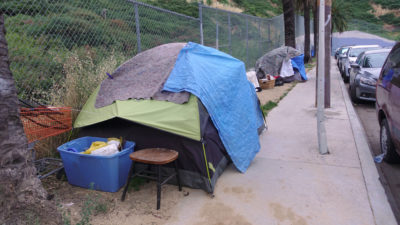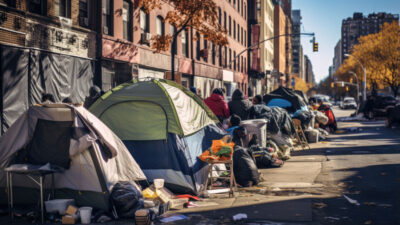Continuing Failed Policies Costs Lives—Banning Street Camping Gets People the Help They Need
I moved here from San Francisco with full awareness that Austin was facing some of the same problems that have Californians leaving in droves. What makes Austin different is that people here are willing to ask tough questions, go against the status quo, and hold their leaders accountable for solving the problems in their community. That political vigilance is as important now as ever. Austin’s leaders have refused to reinstate the camping ban despite devastating consequences for the most vulnerable people in our community.
Three years ago, the Austin city council loosened restrictions on sleeping in public as part of a new strategy to “end homelessness.” Austin’s government based its new policies on Los Angeles and San Francisco’s “Housing First” model, promising permanent housing to chronically homeless people—a promise that no city has been able to deliver on.
Instead of ending homelessness, these policies failed in Austin as they did in California. By 2020, homelessness in Austin increased by 30 percent, to over 2,500 people. And without camping restrictions, those individuals were much worse off. The number of people on the streets increased by 50 percent, while the number of people in shelters dropped by 20 percent. Death, disease, violence, and disorder all increased.
The flight from Austin’s shelters and the explosion of street homelessness after the end of the camping ban are not the results of rising housing costs or “better counting” as advocates of street camping claim. Instead, the data undeniably show that permissive camping laws lure needy individuals away from services and back out onto the streets—and not just from within Austin. The city’s own surveys show that 37% of homeless Austinites are from outside the city itself, presumably drawn to Austin’s unregulated streets.
No event exposed the cruelty of allowing unbridled street camping more than the severe weather this past February. While most Austinites experienced life without power, warmth, and water for the first time, their neighbors on the streets were used to being left out in the cold—but this time, they were pushed to the extremes of survival. Six of them died. At least one person died after refusing offers for shelter from an outreach team.
Six lives could have been saved, if only the city had the power to compel people to leave the streets. Many people experiencing homelessness are a danger to themselves and require interventions. A recent UCLA study showed that nearly all unsheltered homeless people suffer from either serious mental illness or substance abuse, and a majority have both. Encouraging people to forsake shelters for street camps makes it easier for them to reject the resources needed to recover.
The physical perils of street camping exacerbate all of the underlying disorders of most unsheltered homeless people. Food-borne disease and vermin proliferate when food cannot be stored and dishes cannot be washed. Without reliable toilets, streets and parks are dotted with toxic human waste.
These inhumane conditions also foster violence. Since the repeal of Austin’s anti-camping ordinance, violence among homeless people themselves went up 15 percent. Last year, more homeless Austinites were killed than in any other year on record, totaling 250 people.
City officials could address the squalor and violence in Austin’s streets by reinstating the open camping ban, focusing on treating substance abuse and mental health conditions, and creating regulated camps with security and sanitation on land away from the city’s streets and parks. These commonsense approaches have broad bipartisan support—a recent poll in Arizona found that 79 percent of respondents, including 73 percent of Democrats, support relocating homeless individuals to designated camping areas. Instead, Austin’s city councilors are repeating the same mistakes made in California—devoting the most resources to deceptive and ineffective solutions like permanent housing.
Austin’s camping policy is a disaster. Allowing street camps without any basic resources, rules, or accountability is not safe or compassionate—it is spineless and deadly. Leaders from across Texas recognize this and are taking action—Senator Buckingham and Representative Capriglione are leading efforts to ban camping at the state level. Yet, Austin’s city council remains unfazed by derelict streets, soaring crime, and public reminders of their failure. We deserve real solutions, not cowardly policies that endanger the very people they are supposed to help.


Where is all that money going to fight homelessness in Arizona? No one knows